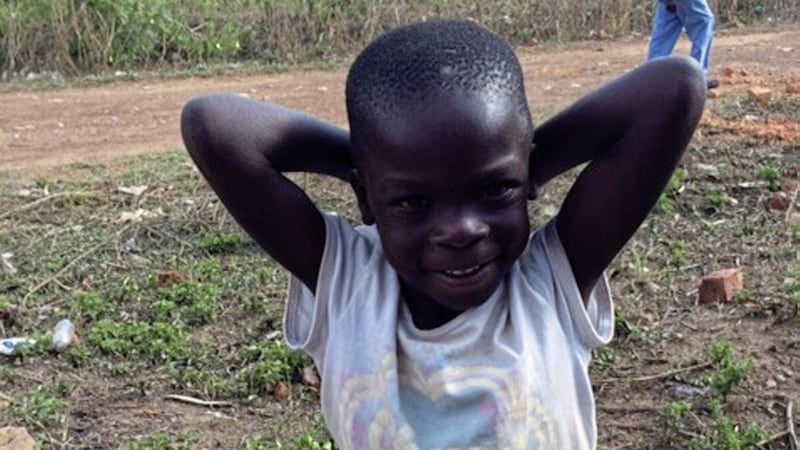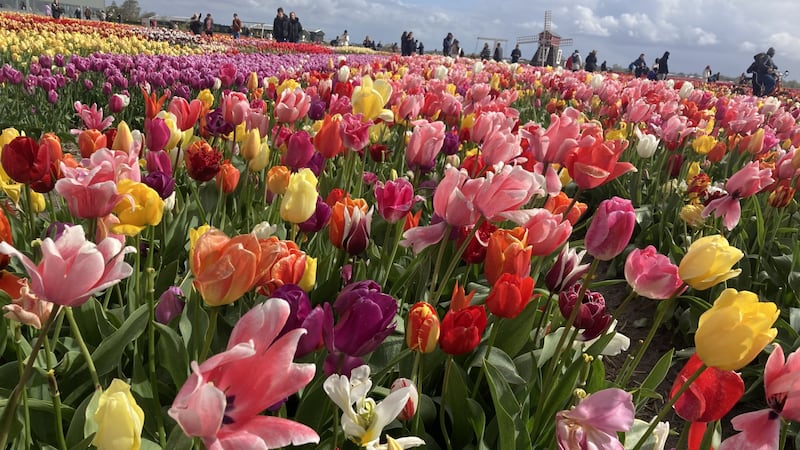KENNETH and his twin brother are just eight years old. They lost their mum in a motorcycle accident – immediately orphaned, with no-one to look after them. We don’t even know Kenneth’s brother's name because he took off – no-one has been able to reach out and gain the scared little boy’s trust. It’s a shocking story.
Like his brother, Kenneth lived rough on the streets for a while until a local woman found him sleeping outside her office. She was able to track down his granny and unite the two. All they want now is to find the third member of this vulnerable little family and bring him home to some warmth and comfort.
If this was set in Belfast there would be outrage. The fact that it’s set in Africa should also bring compassion but Africa is very far away and sometimes we tend to think less of the hardship experienced there. We dig deep for programmes such as Red Nose Day and think that’s enough but it’s not.
There are many organisations quietly working to give the disadvantaged a chance to have a decent quality of life – in the majority of cases, quite literally life itself.
Thankfully someone did care about Kenneth Opio. He was discovered by Aguti Helen, one of the founder members of Acamutu, a group that aims to persuade members of their community of 120 adults and 100 children to agree to testing and treatment for HIV/AIDS, usually the result of rape used as a weapon of war and commercial sex to feed the family.
But they also get the community working towards fending for themselves thanks to the input from War on Want Northern Ireland.
Siobhan Hanley, director of WoWNI, explains.
“We work with Acamutu, giving funding to Helen under a partnership agreement to support her group, to farm small plots of land, growing enough food to eat and sell at markets for school fees and household needs. They are encouraged to grow organic foods, buy an ox to share around and open the land up for a variety of crops, learning about environment protection and conservation and how best to mitigate the effects of climate change.”
Helen has 11 children and five grandchildren but she knows only too well the dreadful existence some children experience and so she took Kenneth in and has continued to support him. Through Helen, the group gave the boy a goat and helped him and his grandmother set up a smallholding, using the communal ox to till the land and sow the seed. He now has security and a small income to pay his school fees and his life is a complete turn-around from a year ago – happy, though if only he could find his brother and draw him into the family.
And War on Want Northern Ireland is a vital part of the picture.
First of all, an important point. War on Want NI has nothing to do with the international War on Want based in London. Our local organisation broke away to establish their own charity in 1976; staff and volunteers raise their own funds and support their own projects, do not have a political agenda, aren’t involved in the Middle East and run no campaigns against big business.
In Northern Ireland the emphasis is on two areas in Africa, Uganda and Malawi, and the charity's projects support the lives of hundreds of broken families. War has already devastated this part of Africa but it’s now drought that is claiming lives. Money for these projects is hard earned, mainly through 13 shops in Northern Ireland, including two bookshops, bringing in the majority of their funding thanks to items donated by the public.
There’s a small workforce in their south Belfast office, with regular visits and Skype conference calls to the staff in Uganda.
Currently the organisation is nearing the end of funded projects with a question over funding for those programmes to continue. What happens after that? Siobhan admits it’s a worrying time.
“We’ve applied for funding from institutional donors but growing competition and changing focus for those funders themselves, we’re as yet unsure how successful we’ll be so we’re thinking of various ways of both raising our profile and securing our financial situation because our need is very great.”
Where emergencies are high profile and bring in huge sums of money quickly, the work of War on Want Northern Ireland is constant, with families devastated by illness and poverty. At present some are forced to eat the seeds they’ve stored to sow for this years crops.
“We work mainly with the elderly, widows, orphans and child-headed households, unemployed youth, people living with disability and those affected by and most vulnerable to HIV/AIDS," Siobhan says.
"We partner with the people who live in the villages and towns, planting trees, teaching them the best way to farm, building their capacity to live a healthy life, also developing ways of marketing their produce without middlemen taking their cut. We help them focus on getting themselves into a position where they are self-sufficient, to be able to feed their families and educate their children so they can have a better life.”
The beauty of WoWNI is that its workers are at the heart of the problem, working with people in the villages, knowing the elderly will appreciate a few chickens and supporting mothers who make little pancakes to keep children nourished. Theirs is a hard life with continuous challenges.
“Our organisation brings more balance to life,” Siobhan reports. “Whereas men used to see women doing the work while they spent the money, now couples are working together proud to set an example, emphasising that they want their children to go to university – even the girls.”
If you would like to support the work of War on Want Northern Ireland at this critical time please contact Siobhan at (028) 9023 2064



